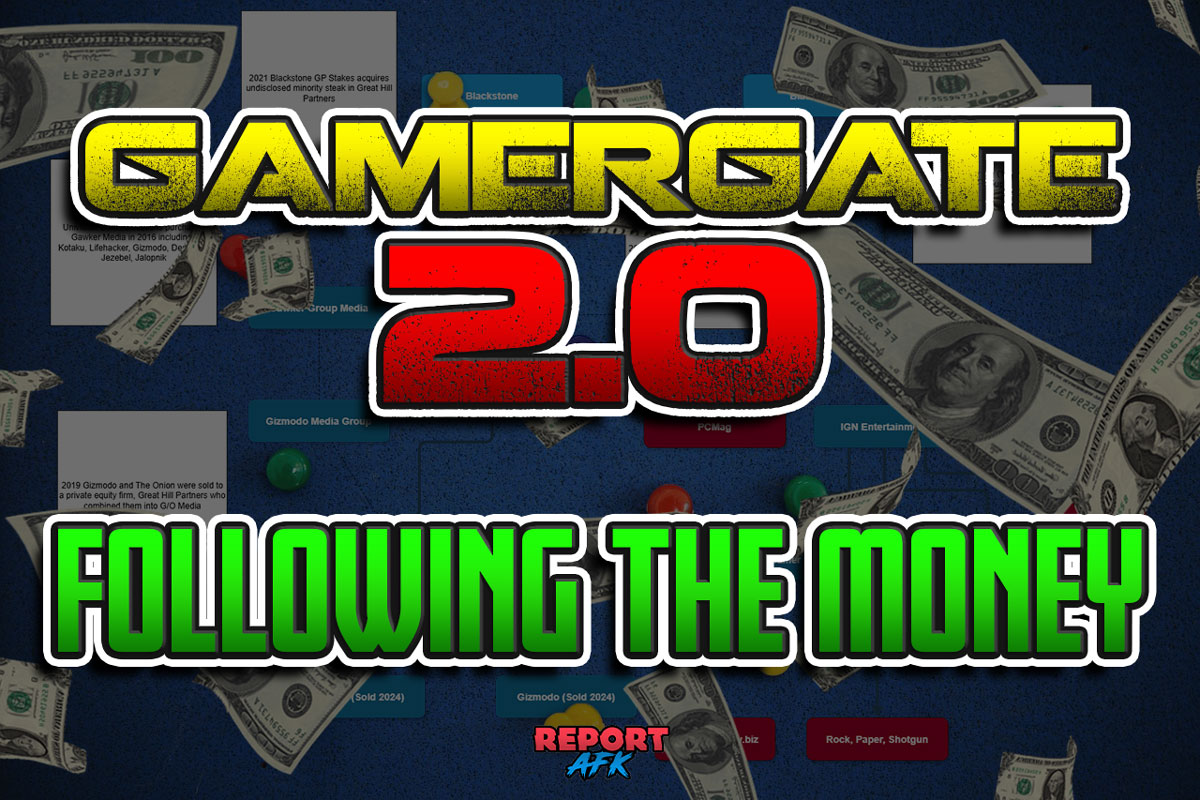
The Gamergate Media Echo Chamber: Following the Money
DramaGaming FailsGaming News 25 295 4 Ayefkay February 7, 2025

Too Many Coincidences
Gaming media feels like an echo chamber. Same talking points. Same narratives. Same forced “hot takes” that just so happen to align with a particular agenda.
But why?
After following the money, it turns out the industry is way more interconnected than you’d think.
Strap in—we’re about to take a look behind the curtain and meet the wizard.
Meet the Gaming Media's Main Characters
Great Hill Partners
In 2019, Great Hill Partners established G/O Media after purchasing the Gizmodo Media Group and The Onion from Univision Communications Inc.
That purchase included several outlets, such as Deadspin, The Onion, Gizmodo, and Kotaku.
Fast forward to today—Kotaku is surprisingly the last one still standing, though barely, considering the mass layoffs it has endured recently.
But here’s where it gets interesting: In 2021, Blackstone GP Stakes (yes, that Blackstone) bought an undisclosed minority stake in Great Hill Partners.
That could be 1% or it could be 49%.
What it is for sure though, is another massive investment firm dipping its fingers into the gaming news industry for funsies.
Little Diagram I Made to Show Gaming Media Relations
Ziff Davis
Ever heard of them?
If not, you’ve definitely seen their reach.
Ziff Davis was once under the aforementioned Great Hill Partners (hmm… cozy), but in 2012, it was sold to J2 Global, which later renamed itself Ziff Davis.
Guess who holds the biggest institutional stake in this massive media conglomerate?
BlackRock. Yep, that BlackRock—the one with a 16.9% stake in Ziff Davis. Don’t worry, that’s only $360M+ at Ziff Davis’s current market cap…
What Does Ziff Davis Own?
A better question might be: What don’t they own?
Just off the jump, Ziff Davis owns PCMag and Mashable, but it gets even better.
Under its subsidiary IGN Entertainment, they also control IGN.com, Humble Bundle, and The Gamer Network. And, since they own The Gamer Network, that means they also own:
VG247
GamesIndustry.biz
Eurogamer
Rock, Paper, Shotgun
Hookshot
And, because they own Hookshot, let’s throw a few more names in that they own under them:
Nintendo Life
Push Square
Pure XBox
Time Experience
Oh….but there was also Red Ventures who sold off many parts of the larger CNET organization (now owned by Ziff Davis since August 2024), like GameSpot, Metacritic, TV Guide, and TechRepublic over the years.
So while these aren’t directly owned by Ziff Davis, a lot of the staff was still retained while moving over from CNET to Fandom so let’s throw these gaming media outlets in more as an association that coincidentally posts extremely similar things to the IGN/Ziff Davis network:
-
GameSpot
-
Metacritic
- Giant Bomb (hey, isn’t that where that Grubb guy works?)
Video: A Look Inside Ziff Davis | YouTube
So…almost every major gaming media outlet is at least partially owned or associated heavily with just two entities: Great Hill Partners (with Blackstone backing) and Ziff Davis (with BlackRock backing).
Having fun yet?
Is Blackrock and Blackstone the Same?
No, but they do have history.
BlackRock was originally a division of Blackstone, but they split in 1990s after selling its stake in BlackRock to PNC Financial for a slick $250M.
Despite the split, they still invest in each other’s companies here and there. In fact, as of January 29, 2024, BlackRock still owned 6.5% of Blackstone Inc. – equivalent to almost 46M shares.
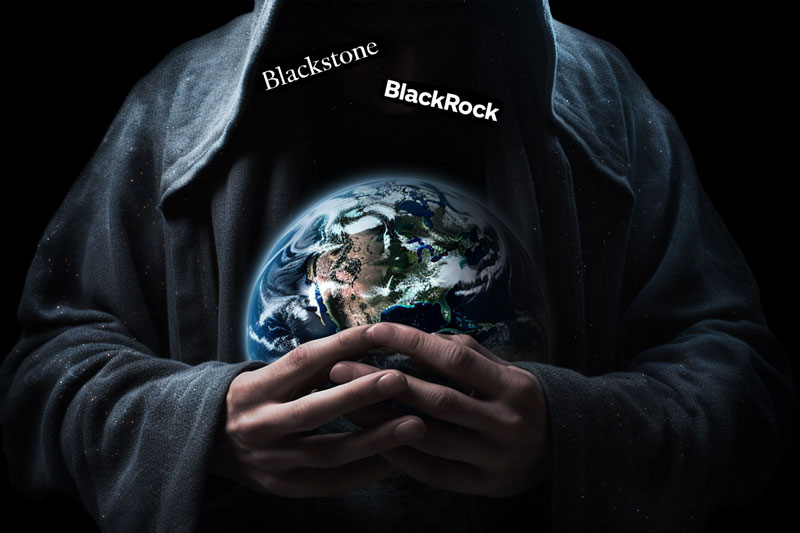
That means even though they’re separate, the money flows between them like an incestuous corporate pipeline.
So when you see Blackstone and BlackRock funding different corners of the media world, just know they’re still financially tangled in the same dirty web and they are heavily invested in controlling the message that the public receives.
Especially in an industry that’s expected to grow to $665.77 billion by 2030 like gaming.
ESG and DEI Coming from the Top
Both Blackstone and BlackRock are major proponents of Environmental, Social, and Governance (ESG) and Diversity, Equity, and Inclusion (DEI) initiatives.
I’m sure you’ve heard of ESG and DEI in gaming.
Ziff Davis, as a good corporate subordinate, openly touts its ESG and DEI commitments. But let’s get real—these initiatives are about pushing ideological conformity, not innovation.
And what happens when investment giants force ESG/DEI policies onto the industry? You get a cascade of woke gaming flops throughout 2024, including:
-
Concord – A game that spent more time on diversity checklists than gameplay mechanics.
-
Dustborne – A narrative-driven “punk rock road trip” that forgot games are supposed to be fun.
-
Suicide Squad: Kill the Justice League – Proof that even beloved IPs can’t survive when saddled with uninspired, agenda-driven storytelling.
-
Dragon Age: The Veilguard – More like “Dragon Age: The Woke Crusade of Cringe.”
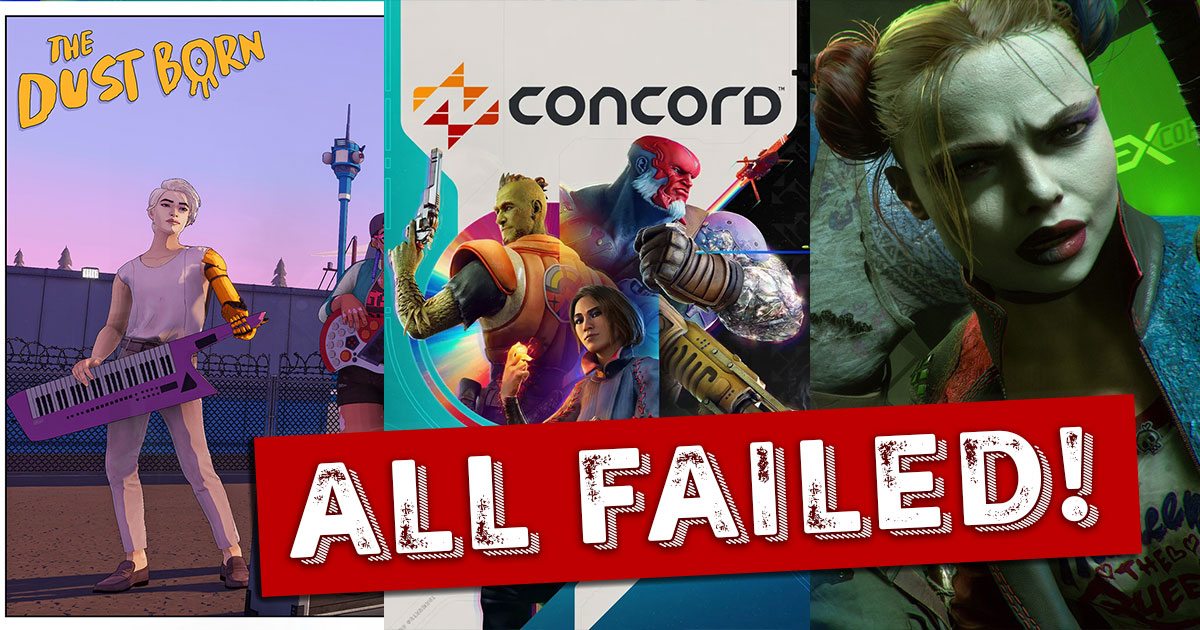
Image: Woke Gaming Flops of 2024 | The Dustborn | Concord | Suicide Squad: Kill the Justice League
These games weren’t just rejected by gamers because of “bigotry” (despite what these media outlets love to claim).
They failed because they weren’t good games.
Yet, the gaming press keeps propping them up, ignoring their glaring failures, and writing off player criticism as “toxic-bigoted-alt-right-extremist-insert-buzzword-here.”
The Media Machine of Lies
Let’s talk about how these media outlets function as a collective megaphone for the same narratives. They push the same stories, prop up the same talking points, and ignore the same inconvenient truths.
Take Black Myth: Wukong, a game that had actual hype and looked promising. Instead of celebrating a well-crafted game, gaming media seemed determined to bash it, nitpicking its lack of “inclusivity” and its failure to align with Western DEI standards.
But those same outlets had no problem blindly championing Dragon Age: The Veilguard, a game players were roasting online for its forced diversity and removal of classic fantasy elements.
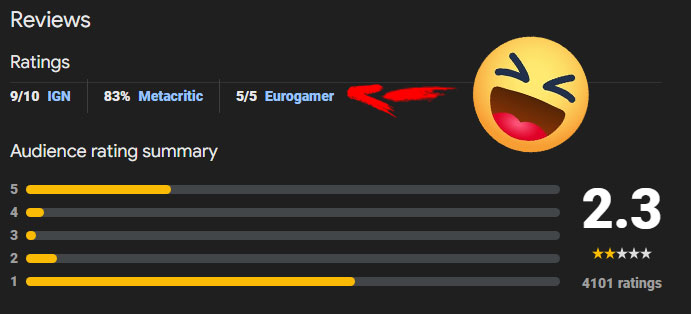
Image Source: Google Reviews | Dragon Age: The Veilguard | Eurogamer and IGN are both Ziff Davis Companies
And let’s not forget the recent Mark Kern and Smash JT fiasco.
When they broke the story that Corrine Busch, the game director for Dragon Age: The Veilguard, had left BioWare – it went through the media’s “telephone game” until the credit ended up falsely attributed to Jeff Grubb and Eurogamer.
Funny how the truth gets distorted when it doesn’t come from the “approved” sources, huh?
Oh, and just a reminder—Eurogamer is part of IGN Entertainment, which is currently owned by Ziff Davis and Jeff Grubb works for Giant Bomb that was owned by CNET until 2022.
That’s the media looking out for its own.
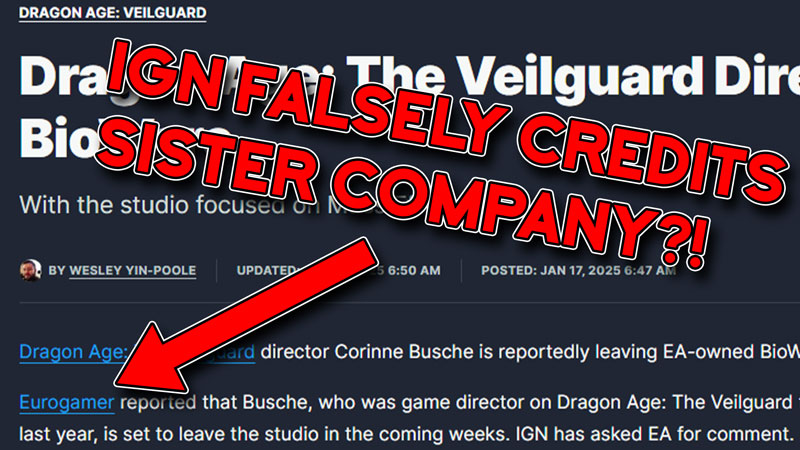
Image Source: IGN | Falsely Crediting It’s Own Sister Company, Eurogamer, Underneath IGN Entertainment
The End Result: Complete Media Bias
Gaming media isn’t just biased—it’s a closed circuit of corporate-approved messaging.
The industry giants at the top (BlackRock and Blackstone) fund media companies (Ziff Davis and Great Hill Partners), which then trickle down to gaming outlets (IGN, Kotaku, Eurogamer, etc.).
Those outlets push an agenda that lines up exactly with the priorities of their financial overlords.
At this point, nobody seriously believes gaming journalists are impartial. They’re supposed to be, but they’re not. They’re not here to inform you—they just want to manufacture consensus.
They dictate which games are “acceptable” and which ones should be ignored or ridiculed.
It’s all one big, self-congratulatory-pat-on-the-ass loop, and the only way to break it is to stop trusting corporate gaming media altogether.
Want More?
Check These Out Next!
About Report AFK
A place for gamers, by gamers, untarnished by legacy gaming media and their herds of sheeple.
Site Links
Copyright 2025 ReportAFK.com
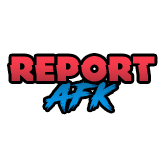


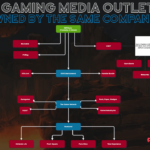

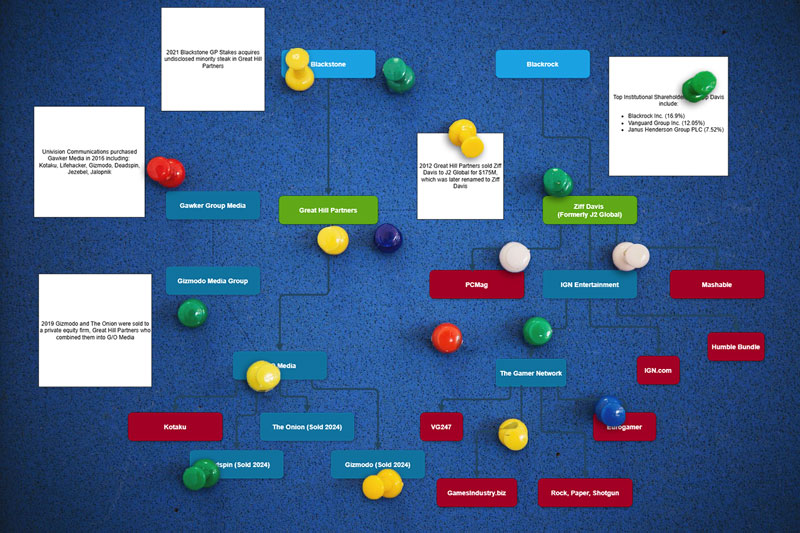
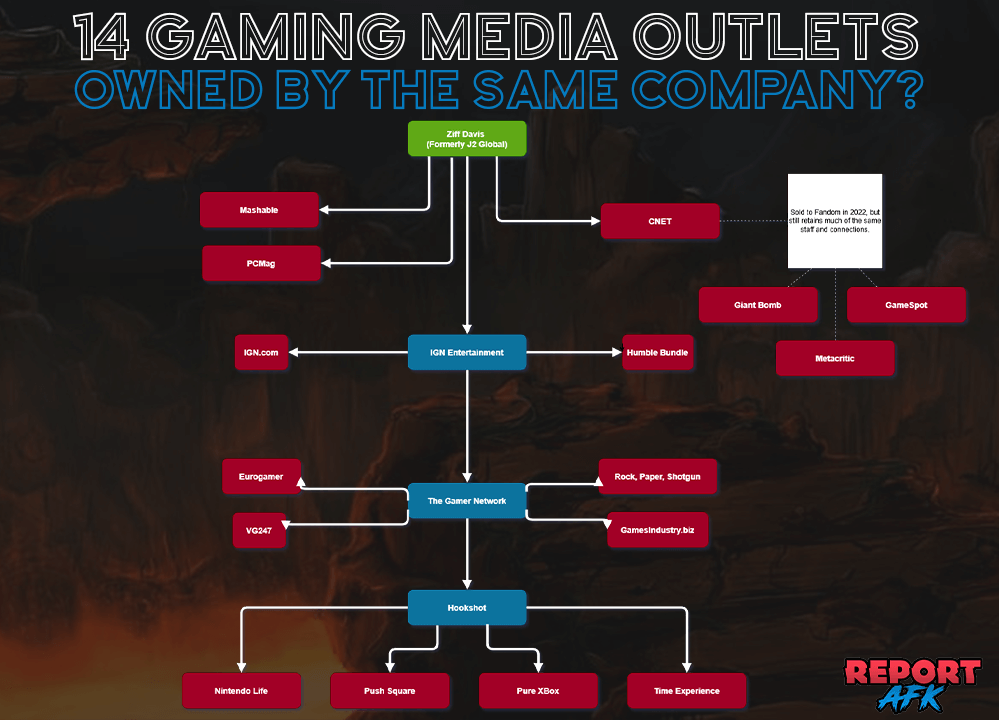

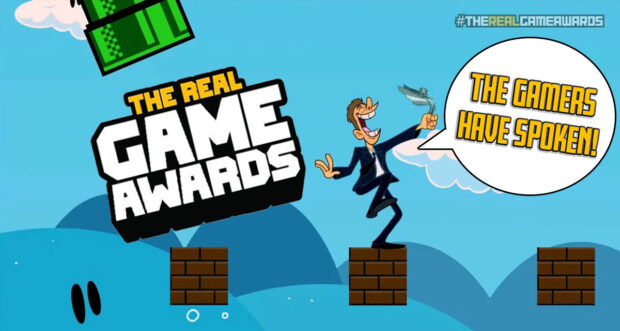
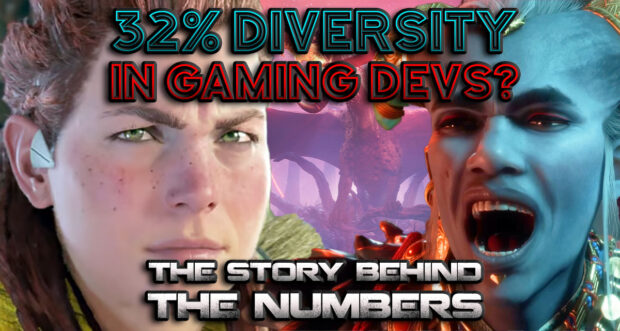




WTF
February 8, 2025
Yo that’s crazy
Ayefkay
February 10, 2025
Yeah, I was honestly pretty surprised how interconnected gaming media is. Thanks for stopping by though!
Derek
February 11, 2025
Is this even legal? Aren’t there antimonopoly laws for this reason?
Ayefkay
February 16, 2025
There are a lot of media that’s centralized, unfortunately, but that’s why I think it’s important to at least bring attention to it so the public doesn’t think that are of these opinions aren’t coming from separate entities. I mean, they are, but not at the same time. Anyways, thanks for dropping by Derek!